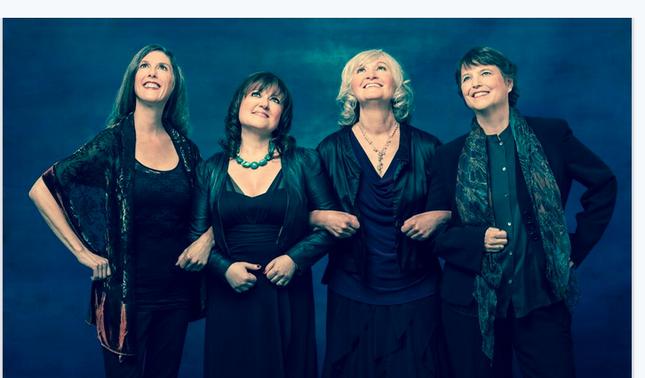Anonymous 4: Heavenly Music at 6th & I Synagogue
By • November 30, 2015 0 819

If you didn’t know about them, you probably wouldn’t expect much from a musical group that calls itself Anonymous 4, but here they are anyway—back in Washington 7 p.m., Sunday, Nov. 22, at Sixth & I Historic Synagogue under the auspices of Washington Performing Arts, having done quite a bit in close to 30 years not to live up to their name.
It’s a special time for the group, which was more or less born in the spring of 1986 when four women with an abiding interest in medieval and renaissance choral music got together for a music reading session in New York. Specifically, they were interested in what medieval chant and polyphony for women would sound like, which, as a topic seems rarefied and specific, and destined to remain so.
In the interim, the women, which included founding member emeritus Johanna Maria Rose, became Anonymous 4 , which has produced more than 20 recordings, many centered in the roots of their special interests, which have sold two million copies under the flag of Harmonia Mundi USA, singing music that ranged from the ecstatic music and poetry of the 12th-century abbess Hildegard of Bingen, music that dates back to the A.D. 1000, 13th- and 14th-chant and polyphony from England, France and Spain and songs ranging from gospel works to carols as well as contemporary songs that fall under the umbrella of American folk music and Americana. They have toured the world over and acquired a passionate following of fans.
They have performed often in Washington—at the Kennedy Center, with WPA—but what makes this particular occasion special is that it will be their last appearance here as a group, as part of something like a farewell tour. They are retiring as a group. Special, too, is the fact that the concert will be focused on their most recent album, “1865: Songs of Hope and Home from the American Civil War,” an unearthing of popular songs from and during the war. There is also the fact that Anonymous 4 will be working with Bruce Molsky, who was described by Mother Jones Magazine as “easily one of the nation’s most talented fiddlers.”
“I guess it will be kind of emotional, and historic,” said Marsha Genensky, who is part of the current group with Susan Hellauer, Jacqueline Horner-Kwiatek and Ruth Cunningham. “I think it’s been an amazing time, to be doing this so long, to discover so many different kinds of audiences out there, to do the kind of music that we do. But it has been a long run.”
Genensky, who lives in the Bay Area in northern California with her musician husband Ernie Ridout, is the groups principal researcher, archivist, administrator and representative. “I guess I’m the one that pulls things together, but really this is like a family,” she said.
Anonymous 4 has moved from the sacred, spiritual choral music that came out of European cities and cathedrals and monasteries to embrace music that was part of most their childhood and adolescence. It was folk music back then, those clear female voices of the likes of Joan Baez, and they came out of American history, and this work comes out of an interest in historical American vocal and singing styles and music, and began with two other works, “American Angels” and “Gloryland”.
“1865” also celebrates the 150th anniversary of the Civil war and as a concert, seeks to resurrect the musical moods and tropes of the period. “These are the songs and the music that people heard, read, and sang themselves, both in the North and South,” Genensky said. “You have to remember that these people lived in a time when there was no recorded music, no internet, no CDs and no instant information. Thousands of soldiers were marching off to war, leaving behind families, friends, children and husbands and lives. People didn’t know what happened to their loved ones, or what was going on for long periods of time. They had to rely on the mail. They literally didn’t know whether a father, a brother, a son, was alive or not—or had survived a battle. So, there was a certain kind of atmosphere over the music that was being written in those days.”
You can hear that clearly just in the titles along, how they crossed political and sectional concern and addressed loneliness and loss, uncertainty and absence. “Songs like Stephen Foster’s ‘Hard Times, Again No More,’ ‘Abide With Me’ or ‘Tenting on the Old Camp Ground’ were equally popular in the North and South,” Genensky said. “Songs like that were the number one hits in their day, in terms of sheet music sales.”
“What’s remarkable is how many of the songs survived down the generations,” she said. “These were songs that became a part of traditional music, but they were also passed down and sung. People knew the lyrics.”
“We’ve had a beautiful time together, all this time,” she said. “I think we want to move on to other things, other projects.”
Even on its last concert tour, it’s a safe bet to say that Anonymous 4 is anonymous no more—especially online, where their fan base has seen them, in some sense, as musical other-wordly superheroes. One voice from a comment section—which can be merciless—read, “The first time someone played a recording by these ladies for me, I thought ‘That must be what angels in heaven sounds like.’ ” Continuing on that theme, another commenter, anticipating a concert, wrote, “This is what heaven sounds like, I’ll bet.”

